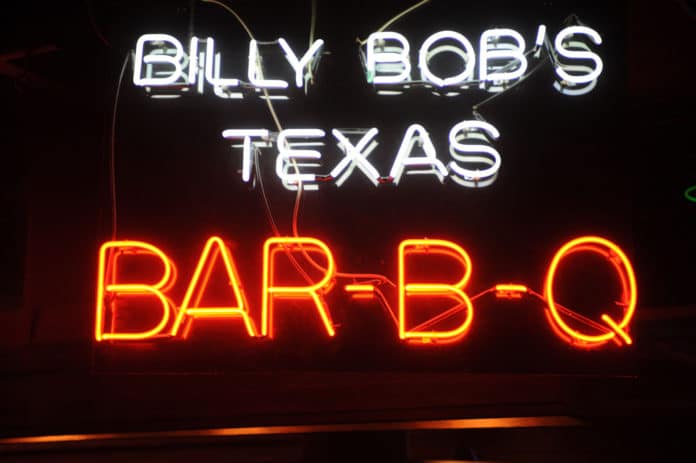A judge’s ruling on Tuesday may not fully mend the feud among owners of Billy Bob’s Texas but it opens the door for the dismissal of the president of the iconic Stockyards nightclub.
State District Judge Mike Wallach declined to grant an injunction that would bring in a receiver and dissolved an order that has kept Concho Minick in place as president during the legal proceedings.
The ruling left some issues unresolved, according to attorneys for both sides of the dispute that put the continued employment of Concho Minick at the heart of the debate over the future direction of the world’s largest honky-tonk.
“We are gratified by the court’s ruling and hopeful that it will lead to an amicable and equitable resolution of this matter …. which should have never been in court to begin with,” said Marshall Searcy, attorney for the majority group of owners that includes Brad Hickman and his family, who own the largest share of club at 40 percent.
Attorneys for Concho Minick and his allies, who include Dallas Mavericks General Manager Donnie Nelson and a business owned by the family of former Fort Worth City Councilman Steve Murrin, said the ruling sets up the potential for continued turmoil in the operation of Billy Bob’s.
“We’re concerned that since the ruling resolves none of the disputes between the parties and doesn’t preserve the status quo, it will create more chaos at Billy Bob’s and will make it more difficult to keep Billy Bob’s on an upward trajectory,” said attorney Mark Torian.
Torian said the most troubling issue is that the judge made no mention of the dispute over the company agreement, which requires unanimous consent on major decisions such as hiring and firing a top manager.
“While the court did not grant the temporary injunction, it also did not determine that the company agreement is invalid,” Torian said. Nor did the judge decide how the club will be governed, he said.
“There is no clarity regarding which group of members will serve as Billy Bob’s managing or governing authority,” Torian said.
Searcy said it is possible that there could be future hearings but the ruling also sets up a scenario for majority-rule decision-making.
Concho Minick and the other minority owners claimed in court documents and testimony during a three-day hearing last month that a majority-rule scenario would deprive them of their ownership rights in important decisions. They said the unanimous-consent rule in the company agreement was the only way to ensure fairness for all owners.
The ruling was “unexpected and I was very disappointed,” said Philip Murrin, son of Steve Murrin.
The ruling came after nearly five days of mediation that failed to produce an agreement between the two sides on the key issues in the case.
“The fact that the owners are deadlocked has been further corroborated by their inability to mediate a resolution over the last several days,” Torian said. “We’re evaluating our next steps.”
Both sides have stood by a commitment to keep Billy Bob’s running and not to sell the club, which has been a Stockyards landmark since it opened in 1981.
During testimony at the hearing, it was revealed that the Billy Bob’s dispute is tied to plans for the redevelopment of the Fort Worth Stockyards, a $175 million project led by Hickman and Majestic Realty of California that is expected to bring more shops and restaurants to the Stockyards and add residences.
Tense relations reached a boiling point this spring when, Concho Minick testified, Hickman tried to have him demoted and reassigned as a result of a series of grievances regarding his work performance. Those grievances involved issues related to Minick’s communication with owners and financial matters, including decisions about his performance bonus, according to testimony.
Minority owners filed the lawsuit after attempts to fire Concho Minick or force him to resign had failed. The bad blood among the embittered owners led to meddling and underhanded tactics, including changing locks to keep Concho Minick out of the club and installing spyware on company computers, according to testimony.
Hickman also testified that Concho Minick’s father, Billy Minick, and Billy Minick’s wife Pam, along with former General Manager Marty Travis, have agreed to run the club in the interim if the judge allowed Concho Minick to be fired.
Billy Minick, the former CEO of Billy Bob’s, brought his son in to replace him once he retired. Concho Minick testified that he eventually fired his father because his father was coming to work infrequently and he was under pressure to tighten expenses.
Billy Minick testified that he felt “disappointed for the owners” in his son’s attitude and behavior. The elder Minick, who owns about a 10 percent share in the club, is aligned with the majority owners against his son.
Nelson, who also owns about a 10 percent share, said real estate development in the Stockyards is at the heart of the dispute among the owners. Nelson petitioned to join the lawsuit as a minority owner last week.
“This is not a dictatorship,” Nelson said. “You cannot make your business partners disappear just because they have questions about your development plans. That’s no way to build support and consensus behind any Stockyards redevelopment.”






